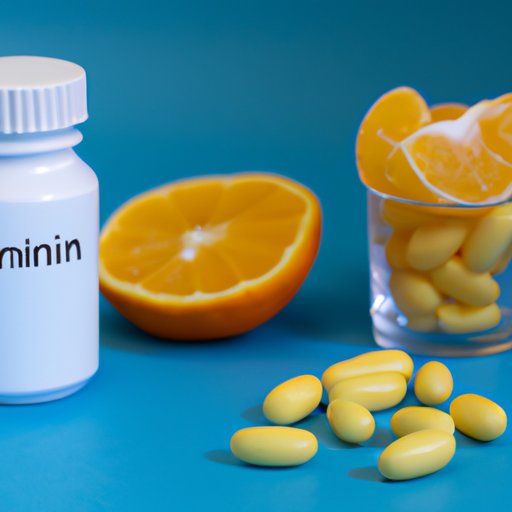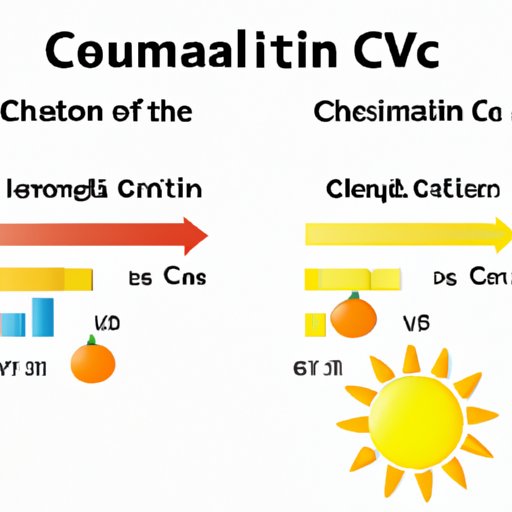
Does Vitamin C Help Colds?
The common cold is an ailment that people of all ages, backgrounds, and geographic locations frequently experience. Despite common cultural wisdom regarding remedies and treatments for the common cold, still, people are left with lingering questions about how to battle this pesky virus. One question is whether supplementing with vitamin C can in fact help alleviate the symptoms and shorten the duration of colds. Here, we explore the science and research on how Vitamin C helps with cold prevention and treatment, as well as ways in which you can bolster your immune system with this essential nutrient.
The Science Behind How Vitamin C Helps Fight the Common Cold
Vitamin C, also known as ascorbic acid, is a potent antioxidant found in many fruits and vegetables that our bodies require for basic biological processes. Vitamin C aids in building collagen in our skin, cartilage, tendons, ligaments, and blood vessels, and it functions as an electron transport chain in our bodies’ cells. Additionally, vitamin C fortifies our immune system, helping our bodies fight off infections, cancers, and illnesses.
When it comes to the common cold, vitamin C has several means by which it can aid in prevention and treatment. For one, vitamin C can help improve our body’s resilience by enhancing our immune function. The vitamin works by stimulating the production of white blood cells called lymphocytes, which play a key role in fighting against infections. Another way that Vitamin C helps fight the common cold is by blocking the action of free radicals, which can damage our cells and cause inflammation. Finally, Vitamin C may also interfere with the reproduction of viruses, which can prevent them from advancing and lengthening the duration of the infection.
A Comprehensive List of Vitamin C-Rich Foods to Boost Your Immunity
A well-rounded diet that is stocked with vitamin-C-rich foods can help boost your body’s overall immunity and improve its capacity to fight off infections, including the common cold. So it’s wise to incorporate a variety of foods rich in vitamin C into your daily life. Here is a comprehensive list of foods that are high in vitamin C:
- Oranges, tangerines, and other citrus fruits
- Kiwi
- Red and green bell peppers
- Broccoli
- Strawberries and raspberries
- Pineapple
- Tomatoes
- Spinach
- Papaya
Eating a diet rich in vitamin C helps ensure that your body is getting the optimal amount of nutrients it needs. Furthermore, consuming a diet rich in vitamin C helps improve your body’s absorption of iron, which is another essential nutrient for a healthy immune system. For example, an iron-rich source of food includes spinach.
How to Properly Supplement With Vitamin C When You Are Feeling Under The Weather
If you feel a cold coming on, you may want to consider taking extra vitamin C in supplement form. Although getting your nutrition from whole foods is preferred, taking supplements when you feel a cold coming on can help give your body the recommended daily intake of Vitamin C it needs to fight off the virus.
When it comes to supplementing with Vitamin C, timing and dosage are crucial. If taken in large dosages like 1,000mg or more, vitamin C can cause stomach discomfort. It is thus advisable to space it out throughout the day to avoid digestive irritation and improve absorption. During a cold, it is recommended to consume 1-2 grams of Vitamin C per day to help with symptom management. There are several different forms of Vitamin C supplements that are available. Some of the common ones include ascorbic acid, sodium ascorbate, and calcium ascorbate. When choosing supplements, it’s important to pick a form that works best for your body. For example, some people may find that their stomachs are more sensitive to ascorbic acid or sodium ascorbate, and therefore they might want to opt for the milder calcium ascorbate instead.
The Truth About High Doses of Vitamin C and Their Effectiveness Against Colds
The use of high doses of Vitamin C to battle colds has been a topic of debate in the medical community, with some physicians advocating for it, while others caution against it. A high dosage of vitamin C can mean ingesting amounts of Vitamin C that are higher than your body’s recommended daily intake. There is evidence that suggests that high doses of Vitamin C may help reduce cold-like symptoms, such as coughs, runny noses, and sore throats. However, it is important to note that taking high doses of vitamin C is not without its risks and consuming too much of it can lead to potential side effects.
Large doses of vitamin C can cause a host of side effects, such as diarrhea, stomach cramps, nausea, and even kidney stones. Therefore, it is important to discuss your supplement routine with your doctor, particularly if you take other medications or have any pre-existing health conditions.

An Analysis of How Vitamin C Can Shorten the Duration of Cold Symptoms
Along with managing common cold symptoms, such as sneezing or coughing, Vitamin C supplementation has demonstrated its efficacy in reducing the duration of viral infections. Some individuals may experience more prolonged cold symptoms and longer durations compared to other people—this is where Vitamin C supplements can help. Studies have indicated that taking 1000mg of Vitamin C daily can reduce the duration of colds by nearly 8%, with higher doses and more frequent supplementation resulting in even more substantial decreases in duration. Contributed to its ability to stimulate the immune system and protect against free radicals, Vitamin C can allow individuals to recover from viral infections more quickly.
Debunking Common Myths about Vitamin C and Its Impact on the Common Cold
While it is a common belief among many people that taking large doses of Vitamin C can prevent the onset of the common cold, the research does not support this claim. A review conducted on high dose Vitamin C studies indicated that supplementation could reduce the duration of cold symptoms but had no real significant impact on prevention. Another myth surrounding Vitamin C and colds is that taking excess amounts of it will lead to more substantial immune support. Ideally, your body needs a steady supply of Vitamin C, and when you consume an excessive amount, your body will simply excrete the excess.
A Comparison of Vitamin C Supplements and Which Ones are the Most Effective for Cold Prevention and Treatment
When it comes to selecting the right Vitamin C supplement, you must consider minor factors such as dosage and hidden ingredients. While the Ascorbic Acid type of Vitamin C supplement is the most straightforward form, there are friendlier types available, and the form you choose will affect you. Sodium Ascorbate supplements, for instance, can help lower blood pressure levels, while Calcium Ascorbate supplements can be gentler on your stomach. Additionally, natural sources of Vitamin C may be suitable for those with mild symptoms or those who wish to provide their body with a steady supply of nutrients. On the other hand, those with severe and persistent symptoms may want to consider taking a high dose Vitamin C supplement.
Conclusion: The Takeaway
Vitamin C has been widely studied for its contributions to immune function, reduction of viral infection duration, and support of recovery from common colds. Though Vitamin C cannot completely protect against the onset of the common cold, it can help to alleviate some of its symptoms and decrease the duration of the cold. When it comes to Vitamin C, there are a variety of options available—including natural or supplement sources—and we recommend speaking with your doctor to determine which one is best for your needs. By consuming Vitamin C-rich foods, supplementing with the nutrient when you might need it and possibly building up your immune system over time, can potentially help reduce your risk of developing a cold.




